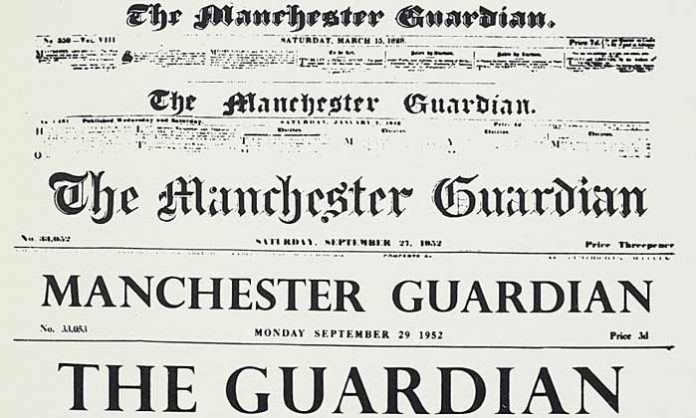Research published today shows that much of the wealth of the Guardian’s founder and his backers was connected to transatlantic slavery
The Scott Trust who own the newspaper published its review into the Guardian’s historical connections with transatlantic slavery.
Academic research, commissioned in late 2020 by the Trust and carried out in three stages by the University of Nottingham’s Institute for the Study of Slavery and the University of Hull’s Wilberforce Institute for the Study of Slavery and Emancipation, sets out a range of connections between transatlantic slavery and John Edward Taylor, the journalist who founded the Manchester Guardian in 1821, and the other Manchester businessmen who funded the newspaper’s creation.
The review establishes that Taylor had links to slavery through partnerships in cotton manufacturing and merchant firms which imported raw cotton produced by enslaved people in the Americas.
Researchers reviewed an invoice book showing that Shuttleworth, Taylor & Co. received cotton from specific plantations from the Sea Islands region of the United States.
Nine of the eleven men who loaned Taylor money to found the Manchester Guardian had similar links to the slavery economy through their commercial interests in Manchester’s cotton and textiles industry.

In addition to having interests in the cotton industry, one of these men, Sir George Philips, was an enslaver of people as co-owner of a sugar plantation in Hanover, Jamaica.
In 1835, Philips unsuccessfully attempted to claim compensation from the British government for 108 people enslaved on the plantation.
The other two backers are likely to have been cotton merchants but researchers were unable to find detailed histories of the men within the stipulated time frame.
The Scott Trust has issued a response to the findings, acknowledging and apologising for the origins of the wealth used to found the Guardian, and for the fact that the Guardian’s editorial positions in its early decades sometimes served to support the cotton industry, and therefore the exploitation of enslaved people.
The Trust has set out proposals for a programme of restorative justice. Over the next decade, and intends to fund an increase in the scope and ambition of Guardian reporting on the Caribbean, South America and Africa, and on Black communities in the UK and US.
It also intends to create a substantial restorative justice fund to support community projects and programmes in the southeastern US Sea Islands/Gullah Geechee region and Jamaica over the next ten years. This fund will be developed with extensive community input and consultation.
The Scott Trust expects to invest more than £10 million in this work over the next decade, with millions of pounds dedicated specifically to a restorative justice fund supporting descendant communities in the Sea Islands and Jamaica.

Ole Jacob Sunde, chair of the Scott Trust, said:
“The Scott Trust is deeply sorry for the role John Edward Taylor and his backers played in the slavery economy. We recognise that apologising and sharing these facts transparently is only the first step in addressing the Guardian’s historical links to transatlantic slavery, which was a crime against humanity.
“In response to the findings, the Scott Trust is committing to fund a restorative justice programme over the next decade, which will be designed and carried out in consultation with descendant communities in the US, Jamaica, the UK and elsewhere, centred on long-term initiatives and meaningful impact.
“These are significant new facts about the Guardian’s origin story, and they must therefore inform our purpose as we move forward, pushing us to do more to reflect the society we aspire to, alongside the radical history of Peterloo which originally inspired our values and our mission.”
Alongside the research, the Guardian today publishes a major journalism series, Cotton Capital exploring the connections between slavery and the Guardian’s founders, the city of Manchester, and Britain more widely. A range of articles, features, podcasts and films will launch as part of this series in the weeks ahead, including a dedicated print supplement published free with the Guardian this Saturday (1 April).
In an article published today, Katharine Viner, editor-in-chief, Guardian News & Media, writes:
“We are facing up to, and apologising for, the fact that our founder and those who funded him drew their wealth from a practice that was a crime against humanity.
“As we enter our third century as a news organisation, this awful history must reinforce our determination to use our journalism to expose racism, injustice and inequality, and to hold the powerful to account.”







